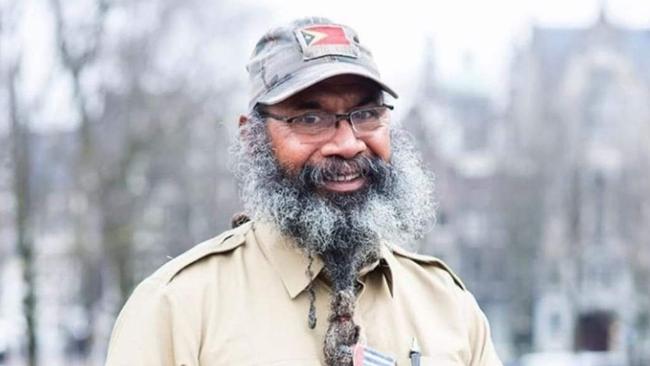Felip Karma was a brave warrior for his tormented people’s freedom
A diver and strong swimmer, Felip Karma apparently drowned. His countrymen are right to question the circumstances – too many relatively young West Papuan leaders die in odd ways.

OBITUARY
Filep Karma
Resistance leader. Born Jayapura, Dutch New Guinea, August 14, 1959. Died November 1, Jayapura, Papua, aged 63.
A noiseless genocide has been taking place on Australia’s doorstep across the often unmapped rainforests and coastal lowlands of West Papua. Great human oaks are being felled there without a sound – a sad and bloody answer to Bishop George Berkeley’s perennial woodland theory: If the outside world’s media is not there to hear it, then they do indeed fall in silence.
During the Indonesian occupation of East Timor its resistance leaders, Jose Ramos-Horta and Xanana Gusmao, were household names in Australia and in 1996 Ramos-Horta won the Nobel Peace prize in exile. The world was watching, but its gaze does not rest on West Papua where Indonesian occupation proceeds unhindered in a country 200km closer to us than East Timor.
In a 1962 deal negotiated by the US, which was cut to appease the Indonesians lest they fell into the Soviet sphere, it was agreed Indonesia would assume control of West Papua until a UN-overseen referendum offering it independence. That took place in 1969, the so-called Act of Free Choice, in which 1025 Papuans selected by the Indonesians voted. There was no choice.
Recently, West Papua’s best-known human rights campaigner, Filep Karma, was found dead on a beach at Jayapura, a town on the far northeastern coast of the country. He was 63, an experienced diver and strong swimmer. But it seems he drowned. West Papuans are right to question the circumstances of his death – too many relatively young West Papuan leaders die in odd ways.
The West Papuan resistance hall of fame contains the names of so many brave men and women. Karma is among them.
It is 18 years since he raised the Free Papua Organisation’s Morning Star flag before a crowd of pro-independence activists. Indonesian troops fired on them, killing an unknown number.
“Every person shall have the right to the freedom of association and expression of opinion,” states the Indonesian constitution, but no one had told these simple soldiers who presumably considered it treason, but their motive may have been racist.
Karma was arrested for his allegedly seditious behaviour, and sentenced to 15 years’ jail. The prosecution had reportedly sought five. He was released “early” after completing 11 years.
“I have been punched, kicked, pulled. But what hurts more is the mental torture we are subjected to,” he told the BBC.
Karma was born at a time when his country was a Dutch colony. His father studied under the Dutch and became a local government officer, remaining after the Indonesians took control.
On a night Karma would never forget, Indonesians soldiers raided the family home and trashed it on a tip-off that some Free Papua Movement members were there.
After university, Karma also became a public servant working in Surakarta, a large city in central Java. He joined protests against then dictator-president Suharto and then began pushing for freedom in his homeland.
Having been present at the massacre on Baik Island in 1998 before which he raised the Morning Star as part of a demonstration for freedom, he believed 100 locals were murdered, their bodies dumped at sea, others buried on local islands while survivors were raped and tortured.
An injured Karma was jailed for more than six years, appealed and was released within a year. During his second, longer stay in jail, Karma – considered a brave and inspirational leader by Papuans – was offered his freedom as long as he abandoned his struggle and apologised. He would do neither.
The Indonesians divided the country into two provinces – West Papua and Papua – reportedly as a traditional colonial divide-and-conquer technique. Even the Indonesian courts ruled this illegal, but the decision was allowed to stand.
On July 1, the Indonesian parliament split the country another three ways, further weakening the resistance movement. The locals fear the administrative posts for these territories will be filled by Indonesians and the corruption and cronyism that sees them benefit little from their natural resources – including some of the most valuable reserves of copper and gold – will continue.
The West Papuans don’t expect much from Australia’s Foreign Affairs Minister. She is concerned about the violence there, and said so when it flared in 2019, but added: “Labor fully respects the territorial integrity of Indonesia.”




To join the conversation, please log in. Don't have an account? Register
Join the conversation, you are commenting as Logout